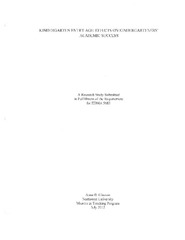| dc.description.abstract | The following study analyzes what affect, if any, kindergarten entry age has on a student’s academic achievement within their kindergarten year and whether or not their pre-kindergarten experience has any effect on their achievement. Students were broken up into two groups; Group O are older students whose birthdays are in the fall and winter and Group Y, students whose birthdays are in the spring and summer. Their DIBELS (Dynamic Indicators of Basic Early Literacy Skills) scores were analyzed from the beginning of the year, mid-year and end of year, looking particularly at letter recognition, initial sound fluency, phonemic segmentation fluency, and nonsense word fluency. Separately, their sight word recognition was analyzed. Students’ parents also filled out a survey indicating where their student went to pre-school and for how many years. The results showed that by the end of the year more than half of the students in Group Y were at or above the benchmark, however, there were also more students in Group Y in the support category. Furthermore, Group Y had more students at or above the benchmark than did Group O. It further showed that more students in Group Y went to academic based pre-schools. The conclusion drawn from these results is that kindergarten entry age does not affect students’ academic achievement to a great degree; their pre-school may be more of a factor in their academic readiness and achievement in kindergarten. | en |


 Maintained by the Northwest University Library
Maintained by the Northwest University Library